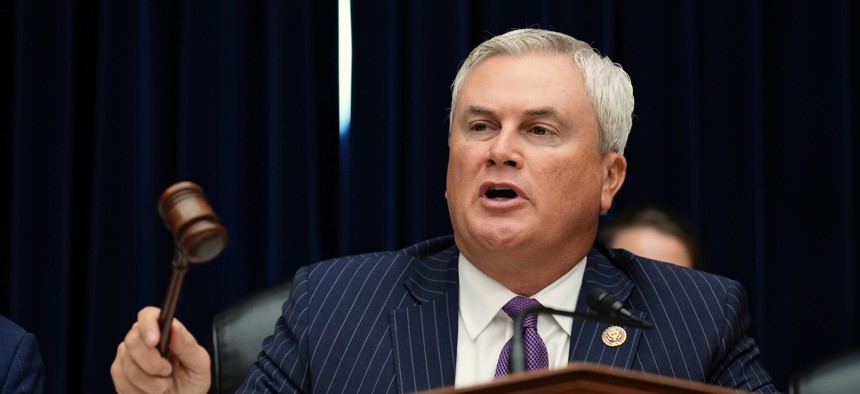
Rep. James Comer, R-Ky., co-authored a letter with Rep. Pete Sessions, R-Texas, requesting information from AmeriCorps on the White House's plans to establish the American Climate Corps program. Drew Angerer / Getty Images
House Republicans want answers on agency spending on Biden’s federal climate corps
The lawmakers launched the probe in part to understand how the administration will recruit 20,000 individuals into government and other roles.
House Republicans launched a probe on Friday into the Biden administration’s new plan to recruit 20,000 young Americans into federally facilitated climate roles, requesting details on how the program will receive funding and which entities are involved.
The American Climate Corps, which the White House rolled out last month, will develop a talent pipeline for jobs in the clean energy and conservation economy. Various federal agencies will help recruit and place applicants into various positions as part of the AmeriCorps program. Republican leaders on the House Oversight and Accountability Committee initiated their review of the program in part due to the Biden administration moving forward with the program despite no specific congressional authorization to do so.
“According to the announcement, as the nexus of the ACC for federal agencies, AmeriCorps seems poised to facilitate the flow of an unspecified sum of federal taxpayer dollars to unknown individuals and entities,” said Reps. James Comer, R-Ky., and Pete Sessions, R-Texas, who chair the overall committee and its federal workforce panel, respectively, in a letter to AmeriCorps CEO Michael Smith. “It is unclear where these funds are coming from and for what purposes they will be used.”
The departments of Labor, Interior, Agriculture and Energy said in September they would sign a memorandum of understanding with the National Oceanic and Atmospheric Association and AmeriCorps to help create what White House officials called an “American Climate Corps hub” that will help coordinate federal recruitment. The Office of Personnel Management is planning to use a previously issued proposed rule to help speed pathways into federal service for individuals in ACC programs.
The White House asked Smith to consider expanding Segal AmeriCorps Education Awards—which cover education, training and student loan costs—to eligible American Climate Corps applicants. It pledged to work with labor unions, nonprofit service allies, the private sector and philanthropy enterprises to collaborate on climate-based partnerships to help expand training and job opportunities.
That approach raises questions about the “identity and goals of the parties who may be applying to AmeriCorps for taxpayer funds to facilitate the ACC program,” Comer and Sessions said. They added it was important to detail exactly which federal or private sector jobs applicants would fill and how they would be chosen.
The lawmakers requested documents laying out exact sources of funding and expenditures by each federal agency. They also asked for any communication between the White House and AmeriCorps and other federal agencies, including all memoranda of understanding. The committee leaders requested additional information on AmeriCorps’ exchanges with various states and advocacy groups. They are seeking a response to their questions, as well as a staff-level briefing, later this month.
In a contentious 217-216 vote last month, House Republicans approved an amendment to a funding bill that would block any federal funding for the ACC. That provision has not yet received consideration in the Senate, where it is unlikely to receive approval from the Democratic majority.
Neither the White House nor AmeriCorps immediately responded to a request for comment on the probe.







